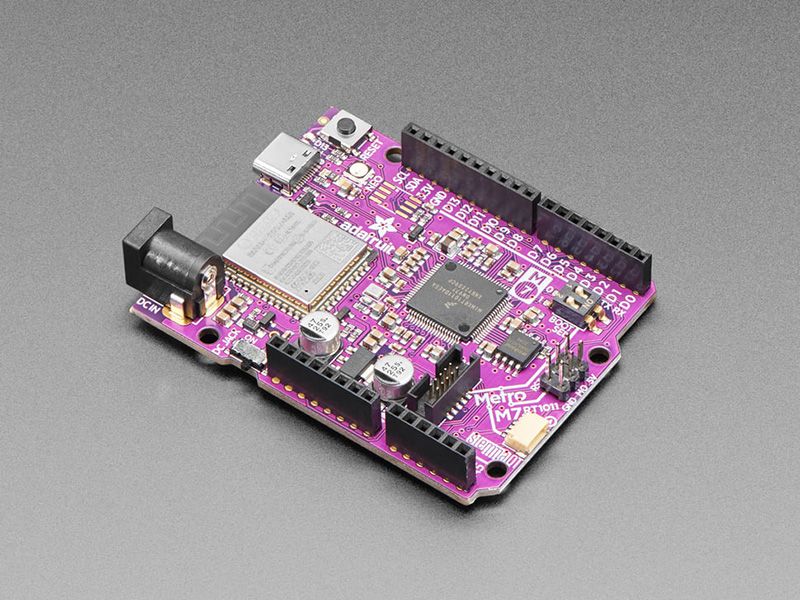Metro M7 with AirLift
by Adafruit

Get ready for our fastest Metro ever - the NXP iMX RT1011 microcontroller powers this board with a 500 MHz ARM Cortex M7 processor. There’s 8 MB of execute-in-place QSPI for firmware + disk storage and 128KB of SRAM in-chip, plus a WiFi co-processor using an on-board ESP32 module.
The iMX series of chips is the fastest microcontrollers around, with a Cortex M7 processor that is more powerful than the M0 or M4, and clock speeds of 500MHz+. For pure performance, there’s nothing better! This chip family is well known for being featured in the Teensy 4 dev board series. Now we have a Metro-shaped board so you can use many Arduino shields, that is fully open source so you can adapt the design to create your own custom layouts, and a USB drag-n-drop bootloader plus CircuitPython support for easy development. Beginners and experts alike will enjoy the combination of low cost, roomy memory and storage, and no-soldering quick start.
Please note that this board does not have Arduino or Platform.io support. You can program it with CircuitPython, a fast-to-start embedded version of the popular Python programming language, or with MCU Xpresso IDE for C/C++ advanced embedded development.
Features:
- NXP iMX RT1011 processor - ARM Cortex M7 processor running at 500 MHz, with 128KB SRAM and high speed USB!
- AirLift WiFi Co-processor, with TLS/SSL support, plenty of RAM for sockets, communication is over SPI and has CircuitPython library support ready to go for fast wireless integration.
- 8MB of QSPI XIP Flash
- ESP32 WiFi co-processor - programmed with ‘nina-fw’ firmware as a SPI-to-Wireless
- Power options - 6-12VDC barrel jack or USB type C
- UNO-shape so shields can plug in
- Reset button - Click to restart, double-click to enter UF2 bootloder
- Boot-mode switches to get into the ROM bootloader (you can always reload code over USB if TinyUF2 gets corrupted somehow)
- SWD connector for advanced debugging access.
- On/Off switch
- STEMMA QT connector for I2C devices
- On/User LEDs + status NeoPixel
- Works with CircuitPython!
- 53.2mm x 72mm / 2” x 2.8”
- Height (w/ barrel jack): 14.8mm / 0.6”
- Weight: 22.5g
Purchase
Contribute
Have some info to add for this board? Edit the source for this page here.
CircuitPython 9.2.1
This is the latest stable release of CircuitPython that will work with the Metro M7 with AirLift.
Use this release if you are new to CircuitPython.
Built-in modules available: _asyncio, _bleio, _pixelmap, adafruit_bus_device, adafruit_pixelbuf, aesio, analogio, array, atexit, audiobusio, audiocore, audiomixer, audiomp3, audiopwmio, binascii, bitbangio, bitmapfilter, bitmaptools, board, builtins, builtins.pow3, busdisplay, busio, busio.SPI, busio.UART, codeop, collections, digitalio, displayio, epaperdisplay, errno, fontio, fourwire, framebufferio, getpass, gifio, i2cdisplaybus, io, jpegio, json, keypad, keypad.KeyMatrix, keypad.Keys, keypad.ShiftRegisterKeys, keypad_demux, keypad_demux.DemuxKeyMatrix, locale, math, microcontroller, msgpack, neopixel_write, onewireio, os, os.getenv, pwmio, rainbowio, random, re, rotaryio, rtc, sdcardio, select, sharpdisplay, storage, struct, supervisor, synthio, sys, terminalio, time, touchio, traceback, ulab, usb_cdc, usb_hid, usb_midi, vectorio, warnings, zlib
Included frozen(?) modules: adafruit_connection_manager, adafruit_esp32spi, adafruit_requests
Features: Wi-Fi, STEMMA QT/QWIIC, USB-C, Arduino Shield Compatible
Absolute Newest
Every time we commit new code to CircuitPython we automatically build binaries for each board and language. The binaries are stored on Amazon S3, organized by board, and then by language. These releases are even newer than the development release listed above. Try them if you want the absolute latest and are feeling daring or want to see if a problem has been fixed.
Previous Versions of CircuitPython
All previous releases of CircuitPython are available for download from Amazon S3 through the button below. For very old releases, look in the OLD/ folder for each board. Release notes for each release are available at GitHub button below.
Older releases are useful for testing if you something appears to be broken in a newer release but used to work, or if you have older code that depends on features only available in an older release. Otherwise we recommend using the latest stable release.
